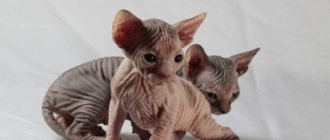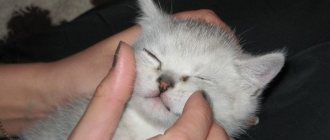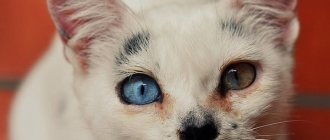The kitten's eyes are sour, what should I do?
- Sour eyes are just a SYMPTOM of some disease (yes, there are many of them and only a specialist can determine what the pet is sick with)!
Therefore, there are two options:
- Remove the symptoms, out of sight, and hope that the pet and its body can cope with the disease on their own!
Take it to a specialist and treat the problem, not remove the consequences!
- Of course, brewed tea sometimes helps with quot;sournessquot; eyes for our pets. But I once read that this procedure is not at all harmful. Therefore, now I exclusively use chamomile decoction. Soak a cotton swab in the broth and wipe your pet’s eyes (about 2 times a day).
- You can self-medicate and wash your cat’s eyes with potassium permanganate or tea leaves, or you can contact a knowledgeable specialist who will quickly find the cause of this illness and prescribe the appropriate medications.
- Souring eyes in kittens occurs quite often, but unfortunately, most often this fact indicates some kind of disease in your pet. If a kitten has sour eyes, I would advise taking it to the veterinarian, or if this is not possible, then remove the worms; if no worms were noticed, still carry out preventive measures just in case. It also happens that sour eyes are transmitted to kittens from birth and in the future they experience it. In the meantime, your eyes turn sour, rinse them with regular warm water, brewed tea or chamomile.
- I also recently got a couple of kittens. And everything was fine, but their eyes turned sour. I bought ordinary chamomile at the pharmacy, brewed it and wiped my eyes with it morning and evening. At first, the eyes continued to turn sour, but after a few days everything went away without a trace.
- Soak a cotton swab in tea leaves and wipe frequently throughout the day.
Don't worry everything will pass
- This disease often occurs in kittens. This is how the eyes become inflamed, pus is released, which dries and the eyelids stick together. Dried crusts cannot be peeled off; they must first be soaked. To do this, you can brew strong black tea or just gently soak the crusts with warm boiled water and remove them. Then wipe the fur around the eyes with a clean, dry cotton swab or napkin. The procedures must be carried out several times a day. If the situation does not improve, you should contact your veterinarian and purchase special drops.
- Keep a food diary, write what he ate recently and what happened next. Wash your eyes with chamomile decoction; your diet includes: boiled meat or fish, mix with oatmeal or buckwheat in a mixer, and a little boiled carrot. Meat broths, a couple of days. See how it feels. If this continues, take it to the vet. If there is no veterinarian, buy any general purpose cat anthelmintic and deworm him according to the instructions. Follow the diet as for a weakened animal; none of the preservatives, dyes, etc. should end up on his plate. Keep sorbent at home in case of poisoning. It could even be a simple allergy to something. With the help of a diary, it will be possible to either guess or draw conclusions about what it is.
Eye injuries
Most often, a cat does not open one eye when a grain of sand, speck or any other foreign body enters it. Movement of the eyelids and eyeball causes pain, so the animal prefers to keep the eye closed. A characteristic symptom of this phenomenon is profuse lacrimation from a closed eye. Over time, tears will wash away the debris from the eye, and the cat will no longer keep it closed. This usually happens after a few hours.
Another likely reason that a cat’s eyes won’t open is an injury while washing itself. If an animal vigorously rubs its muzzle with its paws, it may accidentally damage the mucous membrane of the eye, or get hair under the eyelid. This causes discomfort, so the cat keeps the eye closed until the mucous membrane is restored or tears wash out the hair.
Cats often come into conflict with their relatives. If a cat comes back from a walk dirty, wounded and does not open one eye, it means he has experienced a serious fight with a competitor for his territory. In this case, it is recommended to observe the behavior of the animal. If the cat feels well, despite the injuries, demonstrates a normal appetite and normal behavior, there is no cause for concern. After a short time, the mucous membrane will recover and the cat will open its eye again.
The alarm should be sounded if wounds are visible around the eye, and blood, mucus or pus oozes from under the closed eyelid. If you notice such symptoms, your cat should be taken to the veterinarian as soon as possible to avoid loss of vision. Sometimes conflicts with relatives lead to severe injuries, and bleeding from a closed eye may indicate severe damage.
If the cat's right eye does not open, it is recommended to wait several hours. In most cases, a cat will keep its eyelids closed due to a common household injury. If there is no foreign discharge, and only slight lacrimation is observed, there is no reason to panic. If a cat keeps its eye closed for more than a day, you should show the animal to a veterinarian. It may be necessary to remove the foreign body. To prevent infection of the damaged eye, the doctor will prescribe antibacterial drops, solution or special gel.
First aid
Kittens' eyes often fester, what should I do? Cats' eyes should not normally hurt.
A variant of the norm is the presence of only a small amount of discharge, which is characterized by a non-purulent nature of a cloudy milky or transparent shade in the inner corners. These occur for no particular reason and are not considered a consequence of the disease. Discharge may accumulate after the animal sleeps or after a walk. The alarm should be sounded when they become greenish or yellowish, then this can be regarded as a symptom of the disease.
Not everyone knows how to treat a kitten’s eyes if they are festering. If the animal has a discharge that is uncharacteristic of its normal condition, and its eyes are sore and inflamed, the kitten itself will require urgent help, regardless of the reasons for such symptoms. It is best to immediately go to the veterinarian, but the owner must also be able to independently provide first aid to his animal. Such measures alleviate the condition of pets and relieve inflammation in non-serious diseases.
It is necessary to first rinse the cat's eyes in order to free them from purulent accumulation. The cat may struggle, so you need to immediately wrap it in a towel or hold its paws with your hands. Ideally, this process can be performed by two people. When a kitten’s eyes fester, you should never clean them with dry cotton wool, this will definitely harm the inflamed organ. You should prepare a soft cloth; cotton pads with a medicinal composition for rinsing are also suitable.
Kitten eye problems
Often, owners of small kittens are faced with the problem of sour eyes, especially if the animal was taken from the street. Discharge does not necessarily indicate conjunctivitis or other pathology. Often souring occurs due to the fact that the kitten simply does not know how to maintain personal hygiene. In this case, it is recommended to use special products designed to care for the eyes of cat babies. You need to wipe your eyes with this solution several times a day, and after a few days the problem will be completely solved.
Conjunctivitis in small kittens taken from the street can be a result of dust exposure, and also often develops against the background of infection with parasites. In this case, you can get rid of the problem of souring and inflammation of the mucous membrane only through complex treatment.
In rare cases, an animal's eye does not open due to abnormalities in the structure of the eyelid or injuries received in childhood. This may be due to a fall, impact or other reasons. Kittens face this problem, but not adult animals. For congenital eyelid anomalies, drug treatment is ineffective, but the doctor can perform surgery.
For purulent or phlegmonous conjunctivitis
In the presence of purulent or phlegmonous conjunctivitis, general and local therapy is used. The course of therapy includes periodic washing of the eyeballs with boric acid, followed by their subsequent treatment with syntomycin ointment or any other emulsion with an antibiotic. In this case, novocaine blockade with an antibiotic is also used. In addition to the pronounced, freezing effect, such a procedure will be useful in general therapeutic terms. In addition, antibiotics can be administered intramuscularly. In addition, your veterinarian may recommend sulfonamides for internal use.
Symptoms
After sleep, discharge appears in the corners of the cat's eyes. They should not be alarming, since this is a variant of the physiological norm. It is recommended to simply remove such discharge with a damp cotton swab.
If a kitten rubs its eyes with its paw and they begin to water or fester, it means that it needs to be taken to a veterinarian for examination. Usually the pet is diagnosed with conjunctivitis. Despite the fact that it occurs quite often and does not seem to be very dangerous, an invasive, bacterial or viral disease may be behind inflammation of the conjunctiva.
A little tearfulness usually does not pose a danger to the animal. A sign that the disease has progressed to a severe form is souring of the eyes. In addition, souring can serve as a symptom of a dangerous illness (for example, feline distemper). Treatment of discharge should begin with eliminating the cause that caused its appearance. It is not advisable to deal only with the consequences in the form of lacrimation.
Only a veterinarian can correctly diagnose and successfully treat a kitten.
© shutterstock
Causes
There may be several reasons why a cat’s eyes turn sour:
- The animal has a cold. This may not always be related to the time of year. Sometimes a pet can catch a cold while in a draft or after bathing. If a cat sneezes, rubs its eyes, eats poorly, is lethargic, and the animal’s eyes turn sour, then this indicates a cold.
- Infection with worms.
- An adult pet or kitten has not received the necessary vaccinations, as a result of which a viral infection can settle in its body.
- Inflammation of the cornea (keratitis). The main symptom is that souring eyes become covered with a white film.
- As a result of a foreign body, a blow or a bruise, the cat's eye turns sour, and one eye at that.
- Blocked tear ducts or increased eye pressure. In this case, contacting a specialist is a vital necessity. And this needs to be done as soon as possible. Delaying a visit to the veterinarian may result in your pet going blind as a result of persistent high pressure on the eyeball and fundus.
- Cataract, the first sign of which is souring coupled with clouding of the lens.
- Allergy.
- Features of the structure of the head (British cats).
© shutterstock
There are many ailments that cause sour eyes. For example, calcivirosis, toxoplasmosis, chlamydia. For this reason, the presence of problems with the animal’s visual organs for a long time is a serious reason to consult a specialist.
If your cat's eyes become watery or sour
After sleep, discharge appears in the corners of the cat's eyes.
They should not be alarming, since this is a variant of the physiological norm. It is recommended to simply remove such discharge with a damp cotton swab. If a kitten rubs its eyes with its paw and they begin to water or fester, it means that it needs to be taken to a veterinarian for examination. Usually the pet is diagnosed with conjunctivitis. Despite the fact that it occurs quite often and does not seem to be very dangerous, an invasive, bacterial or viral disease may be behind inflammation of the conjunctiva.
https://www.youtube.com/watch?v=https:ytDPbT7JHTI
A little tearfulness usually does not pose a danger to the animal. A sign that the disease has progressed to a severe form is souring of the eyes. In addition, souring can serve as a symptom of a dangerous illness (for example, feline distemper). Treatment of discharge should begin with eliminating the cause that caused its appearance. It is not advisable to deal only with the consequences in the form of lacrimation.
Only a veterinarian can correctly diagnose and successfully treat a kitten.
There may be several reasons why a cat’s eyes turn sour:
- The animal has a cold. This may not always be related to the time of year. Sometimes a pet can catch a cold while in a draft or after bathing. If a cat sneezes, rubs its eyes, eats poorly, is lethargic, and the animal’s eyes turn sour, then this indicates a cold.
- Infection with worms.
- An adult pet or kitten has not received the necessary vaccinations, as a result of which a viral infection can settle in its body.
- Inflammation of the cornea (keratitis). The main symptom is that souring eyes become covered with a white film.
- As a result of a foreign body, a blow or a bruise, the cat's eye turns sour, and one eye at that.
- Blocked tear ducts or increased eye pressure. In this case, contacting a specialist is a vital necessity. And this needs to be done as soon as possible. Delaying a visit to the veterinarian may result in your pet going blind as a result of persistent high pressure on the eyeball and fundus.
- Cataract, the first sign of which is souring coupled with clouding of the lens.
- Allergy.
- Features of the structure of the head (British cats).
What discharge from a cat's eyes is considered normal? Don't worry or pay much attention to the slight discharge that appears in the corners of your eyes after sleep. Such discharge is a physiological norm and it is best and easiest to remove them with cotton swabs dipped in water. Special drops can also help.
It’s easy to answer the question – why do the kitten’s eyes water. If the baby is taken away from its mother early, the kitten’s eyes will turn sour simply from the inability to take care of itself. Having matured a little, he himself will begin to put his little face in order.
But if your cat rubs his eyes with his paw, be wary.
This will simplify his further visits and examinations at the veterinarian, in the club, and at exhibitions.
Small British kittens, like Scottish kittens, often do not like this procedure and resist in every possible way. In this case, you can carefully wrap the kitten in a towel, thereby immobilizing it for a while. Or try another trick - wipe his eyes and ears when he is sleeping; in a relaxed state he will not actively resist.
This way, your pet will get used to such cleaning and will accept it calmly as it ages. You can use special lotions to clean your ears. Wipe with a cotton pad or cotton swab (if the dirt is deep in the ear) soaked in lotion. Check your ears about once a week; sometimes they stay clean much longer.
If you love your animal very much, then of course you need to look after it very carefully. Provide tasty, fresh food, good living conditions and care products. Then you will notice the very first signs of the appearance of purulent discharge in your cat’s eyes, and it is likely, if the reason for this is not so serious, even by simply washing the eyes with a solution of furatsilin 0.02% or a decoction of chamomile, which will very well clean the animal’s eyeball and will contribute to the healing of damage, as well as the attenuation of the source of eye suppuration.
It is better for you to carry out this procedure using a cotton swab, twisting it into a tube and squeezing a drop over the cat’s eye, or with a pipette. Also, it would be better if one of your family or friends agrees to help you, because the cat will not really like this strange, and also unpleasant, cleansing procedure.
- The cat's eyes are festering
- The cat's eyes are festering
There, your animal will be examined, taking all the necessary tests and finding out the cause of the disease, making an accurate diagnosis, and therefore prescribing the necessary treatment. These may be prescriptions for treatment with antibiotics, powder mixtures, injections, or simply drops and ointments; in any case, all prescriptions must be followed exactly as prescribed by the doctor, because even the slightest deviation can nullify the entire process.
https://www.youtube.com/watch?v=https:krC5kbLIreo
Also, it wouldn’t hurt to pamper your animal a little with good nutrition, because the body’s fight against diseases takes a fairly large amount of energy and nutrients, so fresh, fortified food will only help your beloved animal return to a healthy lifestyle faster.
In no case should this disease be ignored, because suppuration of the eyes can be a serious signal and lead to fatal consequences. During examinations, you should not touch the eyeball with your fingers or other objects, because even the lightest touch can damage the area of the eye that is already damaged and carries the disease.
If you understand that you cannot eliminate the cause and source of this disease on your own, then you should definitely contact a veterinary clinic, because no one but you will help your pet, and your negligence can lead to disastrous consequences.
To avoid getting into such a situation, you need to simply take care of your animal and follow certain rules. Get vaccinated against infectious diseases in a timely manner, and treat for such common diseases as intestinal upset and lice, because even these can cause the immune system to weaken.
Walk your cat under supervision so that it does not come into contact with stray animals, because they very often have a whole bunch of similar diseases that they themselves may not suffer from, but may be carriers of, and also carry out procedures for maintaining cat hygiene - bathe it at least once every month.
All of the above recommendations are not difficult to do, especially if you love your cat and wish only the best for her. Remember that when an animal is happy, it will definitely thank you for your care with its genuine sincerity, love and warmth. What could be more pleasant than a quietly purring, beloved pet at your feet, as well as its proudly raised tail, at the sight of its owner.
How to wash the corners of your cat's eyes
But if your cat rubs his eyes with his paw, be wary. The distress signal has sounded and your task is to respond to it correctly! That is, take the cat to the vet.
It is no coincidence that we emphasized that you will have to go to the doctor together with the animal, because there are so many reasons for excessive lacrimation that not a single conscientious doctor will undertake to recommend treatment in absentia.
The main diagnosis that is made when a cat has a watery eye is inflammation of the conjunctiva or, simply put, conjunctivitis. But don’t let the familiarity of the diagnosis fool you. Behind the seemingly harmless conjunctivitis are most often viral, bacterial, invasive and other diseases.
Let’s take a closer look at the causes of excessive tearing in cats.
- The kitten's eyes are constantly watering - remember if you missed the vaccination time? While the baby has a weak immune system, viruses that enter the body can manifest themselves in this way.
- Inversion of the eyelids, characteristic of some cat breeds, causes small cracks in the skin, and dirt getting into them leads to conjuntivitis. In fact, entropion (turning of the eyelids) can occur in all cats without exception. But we, for example, have never observed it in outbred animals, but in Persian cats, British kittens, Scottish folds, Maine Coons or Sphynxes, bloat is common. Unfortunately, the only way to stop tearfulness in this case is through surgery.
- Some pets cry due to allergies. Irritants such as chemical odors, aerosols, and deodorants, which we use at home, provoke the appearance of this pathology. Allergies can also occur to certain foods, poplar fluff, pollen, and cosmetics. And if{amp}amp;nbsp,proper nutrition overcomes food allergies, then in other cases only properly selected hormonal medications can help.
- Calcivirosis, herpesvirosis, toxoplasmosis, chlamydia, mycoplasmosis... The list of viral, bacterial and fungal diseases, one of the symptoms of which is tearfulness, is very large and only a veterinarian will be able to correctly identify the problem.
- If the eyes are watery and at the same time covered with a film, then perhaps these are symptoms of inflammation of the cornea, the so-called keratitis.
- A smoky or white lens of the eye most likely indicates a cataract.
- Tearfulness can cause increased eye pressure in a cat. In addition to discharge from the eyes, increased eye pressure can lead to blindness of the animal.
- Blockage of the tear ducts, congenital or acquired, is one of the possible reasons why the discharge does not stop.
- The cat has one eye watering, which means you need to strain your memory again - when was the last time you dewormed? {amp}amp;nbsp,Getting rid of parasites can stop the disease before it becomes severe.
- The cat rubs its watery eyes and sneezes - this is very reminiscent of a cold.
- And, of course, banal eye injuries cannot be ruled out. In this case, as a rule, only one eye suffers, the same one that received the blow.
- home
- Cats
- Cat health
- How to clean a kitten's eyes: advice from veterinarians
We invite you to familiarize yourself with: Peculiarities of training a Chihuahua team, rules, nuances
Treatment
When deciding what to do if a kitten’s eyes turn sour, you need to keep in mind that independent treatment is advisable when you are confident that there is no infectious or viral disease. In this case, positive dynamics should be observed. If after 3-4 days of therapy the animal’s condition does not improve or becomes worse, you should contact a veterinarian.
Before examination by a specialist, you can wash your kitten’s sour eyes with Bars. The product can be used for injuries, as therapy and prevention of conjunctivitis, blepharitis, keratitis.
Dark brown crusts in the corners of the eyes after sleep indicate infection with parasites. You can eliminate the problem by giving the kitten a “Parasicide” suspension. Additionally, it is necessary to rinse the eyes with drinking tea or chamomile infusion. During treatment, watch your baby's toilet and how he eats.
A cat, like any pet, needs care and regular visits to the veterinarian for preventive examinations. Should I panic if my cat's eyes turn sour or is this normal? It’s better not to panic, but you can’t leave the issue unattended! Sticky eyelids can be a symptom of a viral disease or a serious pathology that develops secretly. Before taking action or starting to treat an animal at home, you need to understand the causes of the disease. Of course, it is better to take the cat to the doctor, but what to do if this is not possible?
The clearer the doctor understands the cause of the disease, the more effective the prescribed treatment will be. Do not perceive sour eyes as a harmless inconvenience. Behind inflammation of the mucous membranes there is always a threat of loss of vision or even the organ itself. As practice shows, not many owners can accurately describe the symptoms they observe in their pets. Acidity of the eyes is often referred to as:
- Small dry accumulations in the corners of the eyes after sleep are normal and indicate that the mucous membrane is clearing naturally. These secretions just need to be removed, and most often, the cat eliminates them herself while washing.
- Viscous discharge in the corners of the eyes indicates the natural cleansing of the mucous membrane and the presence of weakened unfriendly microorganisms. There is no need to panic; most likely, within a few days, the discharge from the eyes will become normal again.
- After sleep or rest, the lower eyelid is covered with viscous transparent or cloudy discharge - this may indicate a developing inflammatory process or a severe allergic reaction. In both cases, antimicrobial therapy is necessary.
- After sleep, the cat cannot open its eyelids because they are stuck together with secretions or pus - this is most likely conjunctivitis.
Important! Unlike dogs, cats wash their faces, which can hide the first symptoms of eye inflammation.
We will look into the types and causes of conjunctivitis below. Points 2 and 3 describe disorders that have not yet caused harm, but are most likely to develop into a full-fledged illness. There are many reasons for the occurrence of such conditions. You need to analyze the last few days of your pet’s life and identify possible causes of poor health:
- Trauma or foreign body - a cat can injure the mucous membrane of the eye with any small foreign body. Examine the eyes for localized redness and scratches. Pay attention to whether the cat begins to wash itself more often. Very often, cats injure their eyes with dust and small grains of sand if they have the habit of actively digging for litter in the tray.
- Diseases of the gums and teeth - inflammation of the mucous membranes of the mouth always affects the nose and eyes. The tissues become swollen and red. Until the mucous membranes are attacked by microbes, there will be an increased secretion of tears and an increase in their thickness. Your cat's mouth will most likely have an unpleasant odor.
- Food and non-food allergies are a disease that affects all mucous membranes of the body. The eyes become swollen and watery, discharge appears from the nose, and the increased volume of saliva is usually unnoticeable.
- Helminths - in the absence of prevention, the number of parasites increases sharply, which leads to metabolic disorders and more active work of the mucous membranes.
- Infectious, bacterial damage or weakened immunity - the mucous membranes react to the disease almost immediately, the problem is that in cats this change is almost imperceptible. In animals with immunodeficiency, sour eyes and conjunctivitis are considered chronic and almost “normal” phenomena. Infection with streptococci and staphylococci and similar bacteria invisible to the eye leads to secretive processes in the animal’s body. Sooner or later, the neighborhood results in illness, but it all starts with sour eyes, inexplicable itching and a weakened state.
Sour eyes can indicate a very serious problem - a viral infection. If we are talking about a kitten that was picked up on the street, it is better to consult a doctor, since the baby can easily carry the virus but infect other animals.
Please note that vaccination does not provide a 100% guarantee that the animal will not get sick. In addition, almost all cats that have recovered from viral diseases remain carriers and can become ill again. Common viral diseases of cats that need to be excluded:
- Panleukopenia (distemper) is an acutely developing, highly contagious disease, accompanied by profuse discharge from the eyes, severe swelling of the mucous membranes and inflammation of the eyelids.
- Infectious rhinotracheitis - a sick animal looks as if it has advanced conjunctivitis, a cold and bronchitis at the same time. In fact, this is one disease, viral and very contagious. Pus is discharged from the eyes, nose, and is visible in the upper respiratory tract. The cat sneezes, coughs, breathes with its mouth open. Very often, potential owners take a baby from the street and, seeing that the kitten’s eyes are sour, begin treatment for conjunctivitis. Therapy helps relieve symptoms, but the kitten still needs to be seen by a doctor, since this is a virus that can be dangerous to other animals.
- Calicivirus infection - the list of symptoms includes souring and inflammation of the eyes and copious discharge from the nose.
- Immunodeficiency of cats is accompanied by chronic inflammatory processes of the eyes.
- Infectious peritonitis - accompanied by damage to the eyes and cornea, sometimes blindness.
Some cat breeds are prone to problems with the mucous membranes of the eyes, one might say, naturally. We are talking about tailed animals with depressed noses, very large eyes, very long hair, in other words, breeds bred artificially. Sour eyes indicate that your pet is not suited to the environment in which he is located; the cause may be temperature and humidity, dust, stress, food, bedding material, etc. Some cats need to rub their eyes daily simply because tailed cats do not tend to wash themselves or their long hair gets into the eyes and irritates the mucous membranes. Everything is very individual.
Note! Tearfulness, chronic inflammation of the eyes, sour eyelids may not indicate illness if the animal has a weakened immune system from birth or the proportions of the structure of the muzzle are disturbed.
One of the cat's eyes turns sour! Prescription by a veterinarian doesn't help?
The distress signal has sounded and your task is to respond to it correctly! That is, take the cat to the vet.
- The kitten's eyes are constantly watering - remember if you missed the vaccination time. While the baby has a weak immune system, viruses that enter the body can manifest themselves in this way.
- Inversion of the eyelids, characteristic of some cat breeds, causes small cracks in the skin, and dirt getting into them leads to conjuntivitis. In fact, entropion (turning of the eyelids) can occur in all cats without exception. But we, for example, have never observed it in outbred animals, but in the Persian cat. in a British kitten. in the Scottish Fold. In Maine Coons or Sphynxes, bloating is common. Unfortunately, the only way to stop tearfulness in this case is through surgery.
- Some pets cry due to allergies. Irritants such as chemical odors, aerosols, and deodorants, which we use at home, provoke the appearance of this pathology. Allergies can also occur to certain foods, poplar fluff, pollen, and cosmetics. And if proper nutrition overcomes food allergies, then in other cases only properly selected hormonal medications can help.
- Calcivirosis. herpesvirosis, toxoplasmosis. chlamydia. mycoplasmosis... The list of viral, bacterial and fungal diseases, one of the symptoms of which is tearfulness, is very large and only a veterinarian will be able to correctly identify the problem.
- If your eyes are watery and at the same time covered with a film. then perhaps these are symptoms of inflammation of the cornea, so-called keratitis.
- A smoky or white lens of the eye most likely indicates a cataract.
- Tearfulness can cause increased eye pressure in a cat. In addition to discharge from the eyes, increased eye pressure can lead to blindness of the animal.
- Blockage of the tear ducts, congenital or acquired, is one of the possible reasons why the discharge does not stop.
- The cat’s eye is watering, which means you need to strain your memory again - when was the last time you dewormed? Getting rid of parasites can stop the disease before it becomes severe.
- The cat rubs its watery eyes and sneezes - this is very reminiscent of a cold.
- And, of course, banal eye injuries cannot be ruled out. In this case, as a rule, only one eye suffers, the same one that received the blow.
We suggest you read: Causes of increased salivation in cats
As you can see, eye diseases in cats have many faces and only a veterinarian can find out the specific cause!
Conjunctivitis
Conjunctivitis is a very common ailment that is easily treated with timely assistance. The disease develops and manifests itself when the cat's eyelids and bags in the corners of the eyes swell. If you pull down the lower or upper eyelid, you will notice severe redness in the eyeballs. Irritation of the inside of the eyelids is also expected. Conjunctivitis is so common because there is no single cause, meaning your pet cannot be protected from this disease.
Important! Conjunctivitis should not be perceived as a harmless illness; you need to strictly monitor the course of the disease and additional symptoms.
If your cat is one of the breeds that is prone to eye inflammation, you need to pay special attention to caring for:
- Daily inspection.
- Cleansing eyelids if necessary.
- Keeping your pet's paws clean if he doesn't take care of it himself.
- Shortening the hair between the toes of the front paws (cats wash themselves with their front paws, and long hair can get into the eyes).
If you encounter eye inflammation in a cat that has not received vaccination, you should consult a doctor, especially if your pet has been in contact with unfamiliar animals. Before going to the doctor, it is not recommended to use any medications, but you can wipe your eyelids.
For convenience, conjunctivitis is considered as one type of disease. This is also due to the fact that in most cases, traditional therapy will sooner or later completely eliminate the disease. In fact, conjunctivitis is divided into types depending on the form and duration of the course.
Acute conjunctivitis occurs suddenly; with timely treatment, the symptoms are quickly eliminated. Complete recovery occurs on days 7–10 of treatment. The acute type is usually divided into forms, depending on the duration of the course:
- Catarrhal – recovery in 14–15 days.
- Chronic – acute condition lasts 4 or more weeks.
- Purulent - discharge from the eyes is yellow or green, often has a sweetish or putrid odor. In most cases, the purulent type indicates the presence of ophthalmological problems of a chronic or secretly developing nature.
Follicular conjunctivitis - most often occurs against the background of an advanced acute form, injury, irritation from smoke or gas, abnormal eyelash growth, problems with the cornea, etc. The disease always begins to develop in one eye, but the cat washes itself and spreads the infection to the second. With the follicular form, tubercles (inflamed follicles) are clearly visible if you examine the inside of the eyelids. Even in the initial stage, the inside of the eyelids appears bright red or hot pink.
Symptomatic conjunctivitis - we discussed this type above. Inflammation of the mucous membranes of the eye occurs against the background of a viral disease or inflammatory process of any nature. Allergic conjunctivitis develops against the background of general agitation of the immune system. Typically, symptoms are limited to copious, thick and clear discharge from the eyes. Afterwards, an infectious agent enters the conjunctiva and if the immune system is already exhausted, acute conjunctivitis begins.
Independent conjunctivitis - in medicine and veterinary medicine there is a concept of idiopathicity, that is, the occurrence of an illness for unclear reasons; an independent type can be safely attributed to such mysteries. The doctor can conclude that the cat has an independent form of the disease if it occurs in different conditions and does not depend on the situation or season of the year. Most often, one eye of a cat becomes sour, and even without scrupulous treatment, the inflammation goes away in 3-4 days.
Treatment of conjunctivitis
After making sure that sour eyes do not indicate the development of a viral or infectious disease, you need to help your pet cope with the inconvenience. Please note that self-treatment is acceptable if it helps, that is, you clearly observe positive dynamics. If your cat gets worse or does not see noticeable improvement within 3-4 days, contact your doctor. The absence of positive dynamics indicates that the regimen you have chosen does not destroy the causative agent of conjunctivitis.
When contacting a doctor, the type of pathogen is diagnosed, namely, washing off from the mucous membranes of the eyes. After examining the purulent discharge, it becomes clear what type of microorganism caused the disease. Identifying the exact cause makes it possible to treat with narrow-spectrum drugs that do not have a short list of side effects. Without a laboratory examination, the doctor will prescribe treatment with broad-spectrum drugs. Typically, drops are selected that will kill the majority of common microorganisms in a short time. If treatment does not give positive dynamics on days 2-3, the cat is examined more thoroughly to identify the root cause.
The traditional treatment algorithm is to maintain maximum cleanliness, eliminate reporting and irritation, and use eye drops. To keep the eyelids clean, your cat's eyes should be wiped with tea, freshly brewed chamomile or calendula. Prices for drops vary greatly; for example, broad-spectrum drugs can differ in cost by 10 times or more. The difference is noticeable in the speed of action, for example, using chloramphenicol drops, you will treat a cat for 3-4 days, the same ciprovet will remove all symptoms in 1-2 days. However, there is not much difference here either, since the minimum period of treatment, 5–7 days, must be carried out without fail, even if the symptoms have completely disappeared.
Important! If your pet is prone to allergies or belongs to breeds with a short muzzle, be sure to consult a doctor before starting medication treatment.
Useful materials:
- Cutaneous horn General description of the disease Cutaneous horn on the forehead or face (ICD 10 code - L57.0) -...
- Itching and odorless discharge Main causesBefore considering the factors that provoke the appearance of discharge that has a sour odor, it is necessary to immediately note...
- Normal temperature in animals Normal temperature in different types of animals Veterinary services Day hospital for animals Veterinary certificates Vaccination…
- Discharge in women What kind of discharge between menstruation is considered normal? Female discharge normally consists of mucus from the cervical canal, dead...











